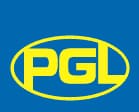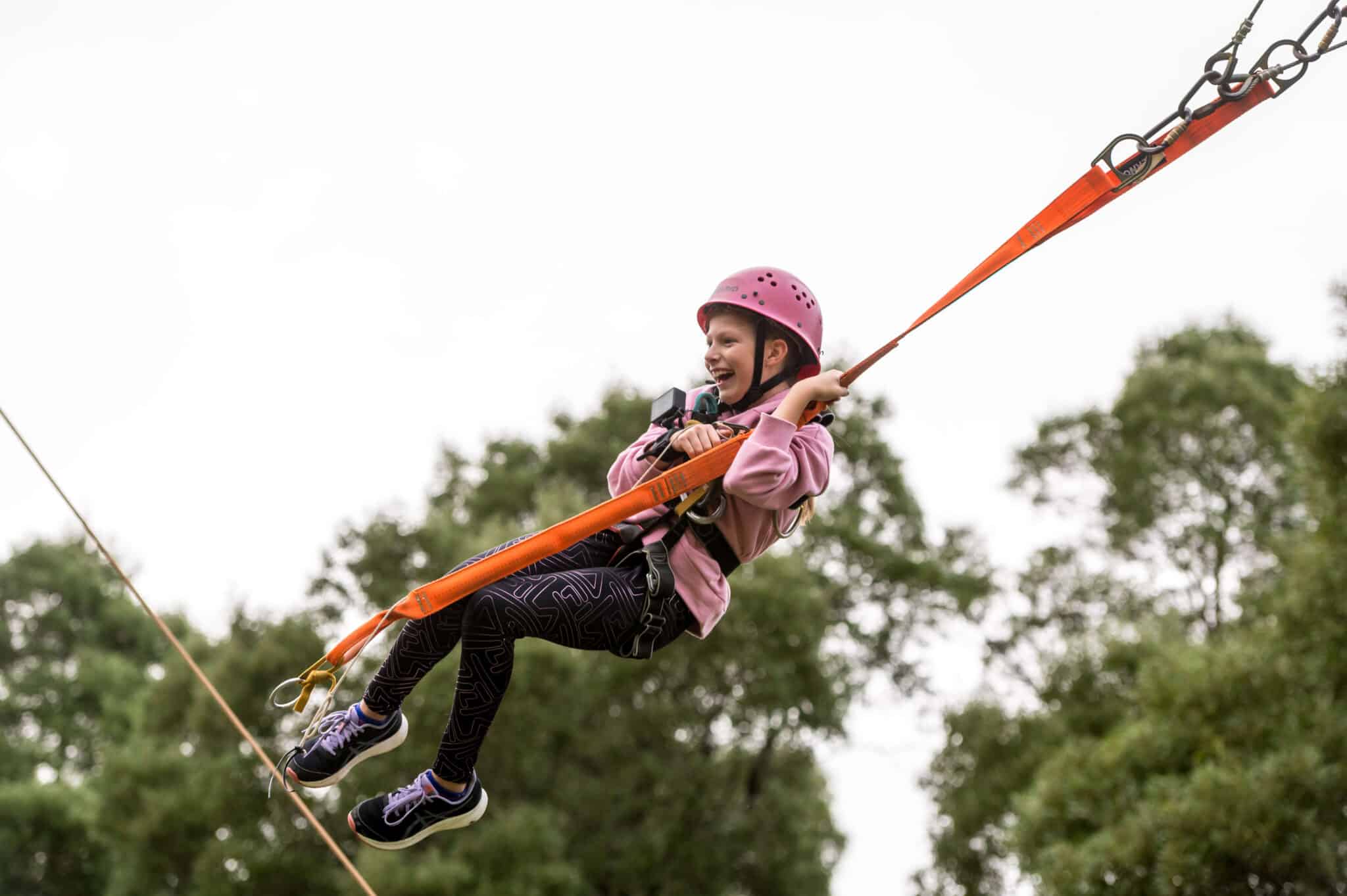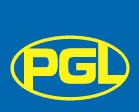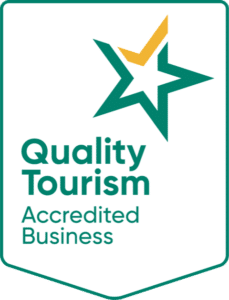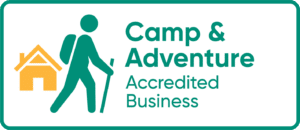Thinking of new and exciting ways to enhance your primary students’ learning? Step out of the classroom and embark on the educational adventure of a lifetime with school camps!
More than just a fun excursion; they are designed to directly support key learning outcomes through a wide range of thrilling outdoor activities. These experiences not only align with the curriculum, but also help students develop essential skills that contribute to both academic success and life beyond the classroom.
In this article, we’ll dive into what learning outcomes are, explore the different types, and show how school camp programs like DISCOVER! can help you maximise your adventure for Years 3 and 4. Plus, we’ll share some useful tips on how to write effective learning outcomes of your own!
What are learning outcomes?
Learning outcomes are statements that define what students should know, understand, or be able to do after a particular lesson, course, or learning experience. Essentially, they provide a clear roadmap for teachers and administrators to guide students toward achieving specific educational goals.
These outcomes are used to shape lesson plans, assessments, and teaching strategies for a wide range of subjects, while helping young learners develop key areas such as literacy, numeracy, personal and social capability, and critical thinking.
The different types of learning outcomes
Learning outcomes can be broken down into five key types, each targeting a specific area of student development. These include intellectual (knowledge and critical thinking), verbal (communication and language skills), psychomotor (physical skills and coordination) and affective (emotions, attitudes, and values).
Here’s a more detailed explanation:
-
Intellectual outcomes
Intellectual outcomes focus on a student’s ability to grasp concepts, understand rules or procedures, and apply their knowledge to real-world situations.
Examples of intellectual outcomes:
In the classroom, this might involve asking students to examine a historical event like the Industrial Revolution and explain its impact on the present.
During a school camp, an intellectual outcome could involve pupils identifying different plant species during a nature walk and discussing their roles within the ecosystem.
-
Cognitive outcomes
Cognitive outcomes focus on how learners think, remember, and process information, shaping their mental approach to specific concepts and act accordingly.
Examples of cognitive outcomes:
In science class, a cognitive outcome might be students explaining the water cycle after conducting an experiment demonstrating evaporation and condensation.
At school camps, it could be students using a map and compass during an orienteering challenge, applying their map-reading skills to find checkpoints.
-
Verbal outcomes
Verbal outcomes involve communication skills, including speaking and listening. It’s the ability to comprehend and recall facts and ideas from books, lessons, or talks.
Examples of verbal information outcomes:
For instance, a student might present their findings from a science project on renewable energy to the class and answer questions at the end.
Outside the classroom, groups on school camps apply their verbal skills by delegating tasks to build a shelter using natural materials.
-
Psychomotor outcomes
Psychomotor outcomes are centred on physical skills, coordination, and movement. These help students perform tasks with greater precision and accuracy.
Examples of psychomotor outcomes:
In class, students use hand-eye coordination for drawing, writing, cutting, and building models in technology or science classes.
Meanwhile, on school camps, psychomotor skills are tested through activities like canoeing, where students must paddle and maintain their stability to navigate the water.
-
Attitude outcomes
Finally, attitude outcomes focus on students’ beliefs, values, and perspectives towards people or situations, intending to cultivate positive attitudes.
Examples of attitude outcomes:
At school, an example might be students showing respect for differing opinions during a class debate, listening actively, and responding thoughtfully without interrupting.
At camp, this could be overcoming a fear of heights during an abseiling activity, boosting their confidence and resilience.
Five ways school camps support learning outcomes
With their immersive and hands-on approach, it’s easy to see how school camps play a pivotal role in student learning and development.
In fact, studies have shown that outdoor school camps significantly improve students’ mental health and wellbeing, reducing anxiety levels by 16%, according to research by the Outdoor Youth Programs Research Alliance (OYPRA).
This supports the idea that time spent in nature, combined with experiential learning, helps Australian students develop resilience and confidence while building important social connections, and life skills through hands-on activities.
Let’s explore further why school camps are essential for achieving learning outcomes. All of the following are key breakthroughs associated with our DISCOVER! program—keep reading to find out more!
1. Develop independence
The importance of independence in children cannot be understated. It’s a key skill that’ll help your young learners throughout their education and life. School camps help to develop pupils’ independence by delivering an adventurous program in a safe and supportive environment, away from the comforts of home and the classroom.
Without parents or teachers to guide their every move, children must take responsibility for daily tasks while being away from home for the first time, such as managing their belongings, following schedules, and making decisions like choosing clothes to wear, or how many times to go back to the salad bar. This aligns with the Personal and Social Capability in the Australian Curriculum, which promotes self-management and decision-making.
2. Build confidence
If you want to know how to build confidence in kids, then school camps are the way forward! Many outdoor activities push pupils beyond their ‘comfort’ zone and into their ‘stretch’ zone, allowing them to discover their strengths. It’s about providing gentle encouragement and positive feedback to help them step into a space they never knew they could reach.
For instance, activities such as a leap of faith exercise have students climb a tall platform and jump to a target. With support from peers and instructors, they learn to overcome self-doubt and embrace new challenges, fostering a growth mindset.
Moreover, consider a student who is hesitant to participate in a group challenge but, after encouragement, takes the lead in solving a problem. This newfound confidence translates back to the classroom, where they may feel more comfortable speaking up and tackling academic challenges.
3. Promote cooperation and teamwork
We know that cooperation is important in your classroom, especially for group work and mutual understanding. That’s where school camps come in! They are the ideal place for students to practice social skills, including communication, collaboration, and empathy, through a variety of teambuilding activities.
For example, a challenge like raft building requires students to delegate tasks, listen to each other’s ideas and work together to stay afloat. Working together as a team to reach a common goal creates a sense of unity. This, in turn, helps reduce anxiety by forming strong bonds with others, meaning students are more likely to feel connected and less isolated. It also shows that valuing different perspectives is key to a successful outcome.
4. Teach new skills
School camps expose students to a range of skills they may not encounter in a traditional classroom setting, whether that’s some of the skills mentioned above, or ones that relate to a specific activity. Learning has no boundaries, and it’s vital that we as parents, teachers and instructors reinforce this to help children thrive in life and education—aligning with the General Capabilities of the Australian Curriculum.
For instance, a student participating in a bushcraft activity learns how to filter water and light a fire safely. These experiences not only build practical, hands-on skills for wilderness survival but also enhance their scientific understanding and critical thinking skills by applying knowledge of natural resources and problem-solving in real-world situations.
Gaining a new ability can be a powerful motivator for young children, and the joy they experience when they realize they’re great at something is truly unmatched—that’s why we do it!
5. Offer new experiences
Differentiating learning is something that can help all students, including primary school pupils. Whether it’s trying new food, learning to climb a tree, or simply singing songs around the campfire, each experience is a step forward towards adaptability, resilience and a willingness to take on new challenges, supporting key learning outcomes.
For example, a student who has never tried archery before may initially find it challenging to aim and shoot with accuracy. However, through practice and guidance, they start to push through their initial struggles, building patience and perseverance.
This openness to new experiences even translates into the classroom, where they may be more willing to tackle difficult subjects or extracurricular activities now that they’ve learnt to approach new experiences with a positive mindset.
Tips on how to write learning outcomes for teachers
Now that we’ve covered what learning outcomes are and how school camps support them, here are a few quick tips on how to write effective learning outcomes, so that your students gain the maximum benefit from their school camp experience. Here are some tips:
1. Use action verbs
Action verbs are crucial in creating clear and measurable learning outcomes. These verbs describe the specific tasks or skills that students will demonstrate. Instead of vague or passive terms like “understand” or “learn about,” use more concrete and active verbs such as “demonstrate,” “analyse,” “create,” or “evaluate.” For example:
- “Students will demonstrate leadership skills in team-based challenges.”
- “Students will analyse the local ecosystem and its biodiversity.”
This ensures that both the teacher and the students know exactly what is expected during the activity and what success looks like.
2. Make outcomes SMART (Specific, Measurable, Achievable, Relevant, Time-bound)
A SMART learning outcome is one that is clearly defined and can be easily assessed. To make your outcomes SMART, be sure to specify exactly what students will do, how you will measure their progress, and set realistic goals within a specific timeframe. Instead of “Students will learn about teamwork,” try:
- “By the end of camp, students will collaborate in at least three team-building exercises, demonstrating effective communication and cooperation.”
This way, students and teachers can track progress, so that the learning experience is both purposeful and results-driven.
3. Consider student age and abilities
It’s also important to tailor your learning outcomes to match the age and abilities of your students. Younger primary school students may benefit from simple, hands-on tasks that focus on basic skills, like team cooperation or following instructions.
Older students, on the other hand, may engage in more complex problem-solving, critical thinking, and reflective tasks. For example:
- For younger students: “Students will follow directions and work together to build a simple shelter using natural materials.”
- For older students: “Students will observe environmental factors affecting the sustainability of local ecosystems and present their findings in a group discussion.”
Adjusting your expectations according to the developmental stage of the students ensures that each child can successfully engage with and benefit from their adventure camp experience.
Achieve your learning outcomes with DISCOVER! at PGL
We hope all of these benefits of outdoor learning in primary school inspire you to venture into the great outdoors with your pupils.
If you’re looking to book a memorable camp experience, consider our DISCOVER! program at PGL. Tailored for Years 3 and 4, this is designed to spark growth and help children build resilience on their first night away from home.
As they explore new environments and push their limits, they’ll gradually gain confidence in a new and supportive environment. Our expert team is dedicated to helping students feel reassured, making their first adventure fun, engaging, and something they’ll remember for years to come.
What are you waiting for? Check out our brilliant range of School Camps for primary school pupils, located in Queensland and Victoria at Campaspe Downs (VIC), Camp Rumbug (VIC) and Kindilan (QLD).
Your pupils are at the heart of what we do at PGL. We put safety first with 100% instructor-led activity sessions. Your PGL groupies are also always available for any questions you may have, just ask!
Contact us today and our team will be on hand to help!
